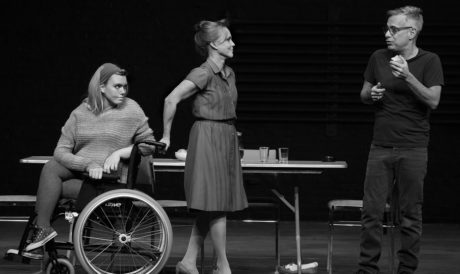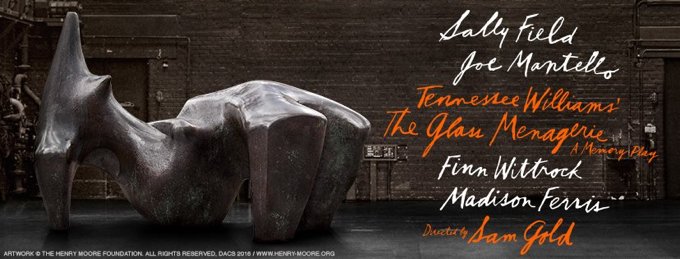This is the play that introduced me to the writings of Tennessee Williams long ago, in 1945! That was the original production at the Playhouse Theatre on Broadway, and it contained the now legendary performance of Laurette Taylor as Amanda Wingfield, one I still recall with all its other-worldly charm, grace and sadness. So it was that I approached the Belasco Theatre with trepidation this time out, for I’d heard rumors that Sally Field and company, under Sam Gold’s direction, had approached the material differently. I needn’t have worried; this beautiful play is in very good hands, all around.
Sam Gold is resident director of the Roundabout Theatre, and his credits are vast. Fun Home won him a Tony Award, The Flick created a stir and furthered his reputation for choosing unconventional material. He, like his fellow director Ivo Van Hove, has a propensity for re-examining older plays, of stripping them of their conventional physical trappings, thus laying bare the bones of the work as written.

Certainly that’s what he’s done with this Tennessee Williams memory play. He has literally removed the set entirely; all he’s had his designer leave behind is a table, four chairs, and a couple of props like a Victrola, and the requisite candles to dimly light the stage when the script calls for a fuse to blow. Oh yes, there is also a small doll‘s house on the floor, the home of the glass menagerie that gives meaning to the play’s title. The play and its players are left, unadorned, to tell us what we need to know.
In Mr. Williams’ script, he describes the scene as “an alley in St.Louis”, and he refers to his characters as “the mother, her son, her daughter and The Gentleman Caller.” The time is “Now and the Past.” From the son Tom’s opening monologue we can hear its author’s plaintive and distinctive voice, for Tom tells us he has “tricks in my pocket, things up my sleeve….. I give you truth in the pleasant disguise of illusion.” Mr. Gold and his sublime cast have their own point of view about all that. They bring us four richly drawn characters, three of whom are trapped on a bare stage in modern clothes of no particular style, speaking with no resemblance to regional accent. His actors are clearly on the same page in terms of projecting four very human beings that bring to the stage vividly alive and fresh characterizations that make this monumental play young again, open to a young audience who have probably not seen it before.
Sally Field long ago left the “flying nun” who introduced her to us in a tv series that occupied her from 1967 to 1970. In an active 50 year career, she has won the Oscar twice and the Emmy three times. Her roles have given her the opportunity to show her great range and her approach to Amanda Wingfield adds yet another string to her bow. Her Amanda is an angry and bitter woman, who has produced two children who fail to bring her satisfaction as a mother. Her fierce love of them is apparent beneath the hard rock of an exterior she has needed to survive all the wrong choices she’s made.
Once an attractive coquette who had “seventeen gentlemen callers show up on one night” to show their regard for her, she rejected them all in favor of an Irishman with a wide smile who worked for the telephone company and “fell in love with long distance”. Her daughter Laura, gentle and attractive, has become a painfully shy and reclusive young woman, totally turned inward to the point where her closest friends are the tiny glass animals she has collected. The son Tom was born into the wrong family. More like his father who abandoned them all “a long time ago,” he’s been stuck in a job at the local shoe factory which has been horrible for him, forcing him to run from home most evenings in order to breathe.

Ms. Field and Joe Mantello are the evening’s prime combatants and their battles are wild. Each of these fine actors manages to show us the rage that runs beneath their surfaces, while maintaining the hint of, in his case the poet, in hers the suggestion of the superficial charmer with enormous emotional needs. Both of them bring highly original qualities to these two iconic roles.
Madison Ferris is a fine actress who is herself more disabled than the Laura that Williams describes. The only time this disadvantage seems at odds with the Laura on the page is when she must tell her mother what’s she’s been doing during the days when she was supposed to be in secretarial school. She claims she’d been walking all day, “mostly in the park”. But in the brilliant scene between Laura and her Gentleman Caller (played with enormous appeal and honesty by Finn Wittrock) as she manages to join him sitting on a cushion on the floor, lit by the candles required because of the electric blackout, she and he bring the play to an exquisite climax. It’s heartbreaking and makes for great theatre.
I left the Belasco theatre not only relieved, but very moved. It only proves once again that first rate material can be re-examined and probed for qualities that the original productions may have overlooked. I don’t agree with all of Mr. Gold’s directorial choices, but I applaud the consistency of his vision, his respect for the material, and the incredible performances he’s helped extract from his quite remarkable cast.
Running Time: Two hours and five minutes, with no intermission.
The Glass Menagerie plays through July 2, 2017 at the Belasco Theatre – 111 West 44th Street, in New York, NY. For tickets, call Telecharge at (212) 239-6200, or purchase them online.





